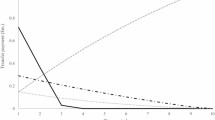Abstract
We employ cooperative bargaining theory and Nash’s ‘rational threats’ idea to cast light on the biodiversity bargaining problem. The problem of global environmental negotiations is argued to be of the nature of a bargaining problem, in which bargainers must agree on the distribution of cooperative surplus in order to move to the bargaining frontier. We discuss the importance of both efficiency (bargaining frontier) and fairness (recognition of characteristics of bargainers) in the choice of the appropriate contract. We show that the incremental cost contract, used to resolve the biodiversity bargaining problem, is of the form of an extreme point contract that fails to recognise the contributions of the South to the production of cooperative surplus. A rational response to such a contract is the use of threats of biodiversity destruction. Contracts must evince both efficiency and fairness in order to represent lasting solutions.
Similar content being viewed by others
References
Barrett S (1994) The biodiversity supergame. Environ Resour Econ 4(1): 111–122
Barrett S (2002) Environment and statecraft. Oxford University Press Inc, New York
Busch L-A, Shi S, Wen Q (1998) Bargaining with surplus destruction. Can J Econ 31(4): 915–932
Copeland BR (1990) Strategic enhancement and destruction of fisheries and the environment in the presence of international externalities. J Environ Econ Manag 19(3): 213–226
Droege S, Soete B (2001) Trade-related intellectual property rights, North–South trade and biological diversity. Environ Resour Econ 19: 149–163
Goeschl T, Swanson T (2002) The social value of biodiversity for R&D. Environ Resour Econ 00: 1–28
Goeschl T, Swanson T (2003) Pests, plagues, and patents. J Eur Econ Assoc 1(2): 561–575
Karp L (1996) Monopoly power can be disadvantageous in the extraction of a durable nonrenewable resource. Int Econ Rev 37(4): 825–849
Kassar I, Lasserre P (2004) Species preservation and biodiversity value: a real options approach. J Environ Econ Manag 48: 857–879
King K (1994) The incremental costs of global environmental benefits. GEF, Washington
Krugman P (1979) A model of innovation, technology transfer, and the world distribution of income. J Polit Econ 87(2): 253–266
Lai E, Qiu L (2003) The North’s property rights standard for the South. J Int Econ 59: 183–209
Leakey R, Lewin R (1995) The sixth extinction. Weidenfeld and Nicolson, London
Martinez-Alier J (2007) Keep oil in the ground: Yasuni in Ecuador. Econ Polit Wkly (Oct 20):4227–4228
Miller K, Munro G, McKelvey R, Tyedmers P (2000) Climate, uncertainty and the Pacific Salmon treaty: insights on the harvest management game. In: Proceedings of the international institute for fisheries economics and trade (IIFET) annual conference
Nash J (1953) Two-person cooperative games. Econometrica 21(1): 128–140
Polasky S, Costello C, McAusland C (2004) On trade, land-use and biodiversity. J Environ Econ Manag 48(2): 911–925
Sarr M, Swanson T (2009) IPR and North–South hold-up problem in sequential R&D, mimeo. http://www.homepages.ucl.ac.uk/~uctptms
Swanson T (1996) The reliance of northern economies on southern biodiversity: biodiversity as information. Ecol Econ 17(1): 1–8
van Soest DP, Lensink R (2000) Foreign transfers and tropical deforestation: what terms of conditionality?. Am J Agric Econ 82(May): 389–399
World Bank (2003) Contracting for biodiversity conservation in agricultural landscapes. Environment Department Paper No.96. Environmental Economics Series, World Bank
Author information
Authors and Affiliations
Corresponding author
Rights and permissions
About this article
Cite this article
Gatti, R., Goeschl, T., Groom, B. et al. The Biodiversity Bargaining Problem. Environ Resource Econ 48, 609–628 (2011). https://doi.org/10.1007/s10640-010-9416-z
Accepted:
Published:
Issue Date:
DOI: https://doi.org/10.1007/s10640-010-9416-z
Keywords
- Biodiversity
- Incremental costs
- International environmental agreements
- Nash cooperative bargaining
- North–south bargaining
- Rational threats




